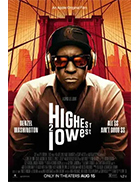Highest 2 Lowest
|  Highest 2 Lowest is the fifth collaboration between director Spike Lee and actor Denzel Washington, whose working relationship stretches back 35 years to Mo’ Better Blues (1990), although they haven’t worked together since Inside Man (2006) nearly 20 years ago. Lee’s output during the past two decades has been copious, but uneven, with dozens of short films, documentaries, and music videos filling the spaces between feature films. While this period has seen Lee hit his greatest commercial success with the critically acclaimed BlacKkKlansman (2018), which won him a Best Adapted Screenplay Oscar, it has also been riddled with critical and commercial misfires. Interestingly, of the eight features he directed since Inside Man, nearly half of them have been remakes: Oldboy (2013), an ill-advised remake of Park Chan-wook’s 2003 film of the same name that was substantially changed by the producers in postproduction; Da Sweet Blood of Jesus (2014), a Kickstarter-funded remake of the low-budget horror classic Ganja & Hess (1973); and now Highest 2 Lowest, an ambitious new version of Akira Kurosawa’s High and Low (Tengoku to jigoku, 1963), which is itself an adaptation of the 1959 novel King’s Ransom by Evan Hunter’s crime-writer penname Ed McBain. The screenplay by first-time scribe Alan Fox maintains the same basic plot as both Hunter’s novel and Kurosawa’s film, although it has been adapted to fit the world of the modern music business. Washington’s character, David King, is a music mogul whose reputation was built on having “the best ear in the business.” That ear landed him on the cover of virtually every magazine and newspaper imaginable in the early 2000s, including Time’s “Person of the Year.” It also allowed him to build his own music label, Stackin’ Hits Records, which made him both a multimillionaire and a cultural icon who shaped, through signing artists and cultivating their careers, a legacy of musical impact. However, David is not the king he once was, and at the beginning of the film he has leveraged virtually everything he owns to get enough cash to buy back the controlling interest of Stackin’ Hits that he sold several years earlier. David is still immensely wealthy, sharing a palatial corner high-rise penthouse on the Brooklyn waterfront with his wife, Pam (Ilfenesh Hadera), and his teenage son, Trey (Aubrey Joseph), but he knows that he is about to put everything on the line. However, his plans are thrown into disarray when he learns that his son has been kidnapped and the kidnapper is demanding that he pay $17.5 million for his return, which not only would take his home and prized art collection (which is prominently displayed throughout the film), but would decimate his plan to buy back Stackin’ Hits, which is essentially his first child. But, then there is a twist: It turns out that Trey has not been kidnapped, but rather his friend, Kyle (Elijah Wright), who is the son of David’s driver, Paul Christopher (Jeffrey Wright). Despite the mix-up, the kidnapper still demands the ransom or Kyle will be killed. The three detectives assigned to the case (John Douglas Thompson, Dean Winters, and LaChanze) assure David that they can control the situation and retrieve the ransom money if he pays it, but he is not so sure. So, now David is stuck in a particularly sticky moral conundrum: While he was fully prepared to destroy himself financially to get his own son home safe, will he do the same for his driver’s? The situation is complicated by the fact that Paul is a good friend of David’s; they grew up together in the same housing project, and David helped Paul when he was a recently paroled ex-con, getting him back on his feet and giving him a job. There is a personal relationship between the two men that did not exist in Hunter’s novel or Kurosawa’s film, both of which leaned more heavily on the sharp class divide between the wealthy businessman and the working-class driver who is nothing more to him than a functionary. There are allusions to that divide in Lee’s film, but it is muddied by the fact that men are friends and have a shared history, which makes King’s reluctance to use his money to save Kyle particularly brutal. This being 2025, the impact of social media has to be considered, as well, and one of the queasiest moments finds King debating the mediated fallout if he decides not to pay the ransom; will the blood on his hands be quickly shuffled into the dustbin of yesterday’s news, or will it stick through the combined cycles of TikTok, Facebook, and X? The film’s moral underpinning is sharp when it is the focus, but it loses its power as the film moves into its second act, which is dominated by the complex, suspenseful hand-off sequence on the 4 train from Brooklyn to the Bronx amid a cacophonous Puerto Rican Day festival, and a third act in which we meet a crucial new character, an ambitious and deluded young rapper who goes by the name Yung Felon (A$AP Rocky). It is at this point that, despite maintaining a strong narrative current, the wheels start to come off the story. King himself has to morph into a hardened equalizer, which doesn’t entirely gel with his earlier characterization as a family man and business magnate with great ambitions that don’t entirely cloud his humanity (Washington does a generally superb job with the character, although he is best when playing David’s weariness and desperation). We are also made all too aware of how contrived some of the earlier sequences are, especially the complexities of the ransom hand-off that, in retrospect once we meet the kidnapper, seem entirely beyond his organization abilities. Lee, as he often does, gives in to the temptation to deploy unnecessary flourishes, including distracting wipe edits using the Stackin’ Hits logo that feel wildly out of place and a guest appearance by Rosie Perez, whose career began with her role in Lee’s breakout Do the Right Thing (1989). The film likewise suffers from some thin characters, notably Ilfenesh Hadera’s Pam, whose personality is largely dictated by plot necessity: At times, she appears to be a strong, independent voice within the King family, but at other times she functions primarily as a trophy wife with no real standing. The heart of the story, though, is David’s, and Lee imbues the film with a strong emphasis on family and the challenges of moral certainty, which gives Highest 2 Lowest a vitality that even its various weaknesses can’t entirely undercut. Copyright © 2025 James Kendrick Thoughts? E-mail James Kendrick All images copyright © A24 / Apple Original Films |
Overall Rating: 

 (2.5)
(2.5)


